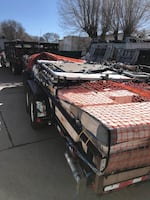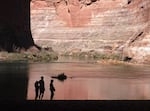On March 2, former “Oregon Field Guide” photographer Nick Fisher dropped into the Colorado River with 15 other people for a rafting trip through the Grand Canyon. They emerged from the trip to a world turned upside down.
For the next three weeks, Fisher would be protected from both outside news and from the contagion that was spreading around the world. Those of us aware of his trip knew we wouldn’t hear from him until he started posting again.

On March 1, 2020, Fisher posted this photo on his Facebook page. The caption read: “3 weeks of raft gear. Time to go hide in the Grand Canyon. Good luck everyone.”
Photo courtesy of Nick Fisher
That happened on March 24.
Along with the stunning photos that are Fisher's trademark, he posted this article from the New York Times "They Went Off-Grid. They Came Back To Coronavirus."
The article profiled a rafting party like Fisher's, that had set off through the Grand Canyon in late February and came out 25 days later to find the world utterly changed. The article appeared two days before Fisher and his party got off the river.
“Oregon Field Guide” Producer Jule Gilfillan reached out to Fisher to see how much his experience resembled that of Edler’s party. Here’s our conversation with him.
Nick Fisher: Those guys launched a little before us, so they went in with less information. When we went in, we knew things were getting weird in South Korea and Italy and making jokes about how things might look in three weeks – would it be the end of the world? We joked about it, but we also knew it was a possibility.
Jule Gilfillan: Did you think about what might be happening in the outside world while you were in the canyon?

On March 24, Fisher posted photos with the caption: “Just got off 3 weeks floating thru the Grand Canyon, and came back to a strange new world.”
Photo courtesy of Nick Fisher
Fisher: Not really. We didn't know how bad it would be so we weren't overly focused on it.
Basically, you’re in a deep, isolated canyon floating a big river. It’s pretty easy to block everything else out. You’re concentrating on getting through rapids, making food, setting up and taking down camps. You’re trying to be jovial and deal with the elements.
The weather was unpredictable. We started in beautiful sunny weather and then it got stormy and cold. When you get into an environment that is changeable, you focus on your survival and safety. We had a rockfall in camp one night. There was flooding in camp. Just dealing with Mother Nature doing her thing is pretty intense mentally and physically.
But adversity is part of it; it puts stuff in perspective and helps you concentrate on what’s going in the moment.
Gilfillan: Talk about the physical environment you're passing through – for most people this would be the trip of a lifetime.
Fisher: Definitely. I've done it one other time, but it's an amazing place, so you can easily do it more than once. There's a lot to take in.
You're rafting through rock that's millions of years old. Each layer of rock goes back millions of years. Your time reference gets put into a different place and you're reminded that you're a pretty small part of a much bigger picture.
The river was running 9,000 to 16,000 CFS (cubic feet per second). Unfortunately, there are no pics of us running the biggest rapids because we were busy. But it puts you in your place. It’s humbling.
Gilfillan: While you were in the canyon, did you get any news about what was going on?
Fisher: Our trip was early in the season, so there are no commercial trips on this part of the Colorado and almost no one else on the river.
About half way through, we came to the guard station called Phantom Ranch. It’s a spot where you can hike in from the rim and some people who can’t do the whole trip get off (the river) and new folks take their place. We had three leave and three new people get on. A couple of them had already been camping for a few days so they weren’t up-to-date on developments. The other guy who got on let us know that things had gotten more serious.
That was the first time we realized, “OK, this isn’t going away right away.” But he wasn’t all doom and gloom, and the ranger there didn’t say anything about it. People were still hiking up and down and the campground was open. Things seemed pretty normal.
A few days later, we started to notice that we weren’t seeing any airplanes. We wondered if we were just out of the flight path. I remember the first day I didn’t even see any contrails. I wondered, “did they shut all the flights down?”
About that time, we got a message on our satellite phone from the sister of one of the guys. It said something to the effect of “Brace yourself – it’s not going to be the same when you get out.” There was no detail, just that. It sounded like a heads-up.
We continued down the river and there were a couple other groups that we’d see now and then; we’d sort of leap-frog past each other now and then.
Then, all of a sudden, we started getting passed. There was a group with Canadians and Alaskans that we hadn’t seen before. They were on a longer trip, like 27 days. They’d received news over their sat phone that the Canadian border was closing. They were cutting six days off their trip. They had to figure out how to get back to Canada and the Alaskans worried how they’d get flights home. The thought went through my head: “OK, this thing’s here. It’s real.”
After they took off, we started talking about it and whether or not we should change our plans. But we’d arranged the shuttle to meet us on the 22nd, and we still had things we needed to do to get down the river. So, we decided to keep to our same schedule.
Gilfillan: What happened when you finally got out?
Fisher: We got out on the Hualapai Indian Reservation at Diamond Creek.
The outfitter was there to meet us and take us and our gear to Las Vegas. So, he gathers everyone up and hands out these blue Nitrile gloves for us to put on. Then he warns us that hotels have been shut down and lots of flights cancelled. He told us we needed to be prepared to rejigger plans in order to get home.
Gilfillan: What did you think then?
Related: Is It Still A Good Idea To Enjoy Oregon's Outdoors?
Fisher: We weren't surprised, but we also weren't prepared. About half of us are from the West Coast, so we weren't in the same boat as some of the others, who came out from Washington, D.C.
Gilfillan: Where did you go if all the hotels were closed?
Fisher: We got lucky and our shuttle driver took us to one hotel in Vegas that was reserved for airline pilots. Because we were "clean," we were allowed in.
Gilfillan: You mean "clean" in the sense that you'd been effectively quarantined for three weeks?
Fisher: Yeah – that was really the only kind of "clean" we were. We needed a shower for sure (laughs).
But actually on big river trips like this, you’re actively trying to keep yourself healthy; no one wants to get sick or get someone else sick in a place like this, where it’d be hard to get out or get rescued. So, you’re constantly using hand sanitizer and washing your hands.
Gilfillan: What was Las Vegas like?
Fisher: It was weird. We drove down the strip to see what it looked like. There were no pedestrians. It was kind of apocalyptic.
We heard the airport was handling like 10 flights a day because an air traffic controller there had gotten the virus. But the other thing was you could get random flights for like $20 –a flight to Boston was like $20. So, it was a good time to get a cheap flight (laughs).
Gilfillan: How did you get home?
Fisher: I was with a couple buddies from Portland who decided not to fly home. I'd reserved a rental car, so we went to pick that up.
The rental place was a trip. It was totally deserted. The car I’d reserved was just a basic, cheap car. But they told us “take any car on the lot,” so we chose this fancy Mercedes SUV. They tossed us the keys and away we went (laughs).
Gilfillan: What's it been like since you got home?
Fisher: After I spent a couple days recovering, I realized being on the river was kind of good preparation for what we had to come back to.
For three weeks, we’d been reminded of our little moment here on Earth and living the simple life of just surviving. When you compare that to all the other crap in the modern world, it reminds you that you really can simplify your life. You remember what really is important and that all you really need is a tent, a sleeping bag, food, good company and a good view. All the other stuff we get caught up in doesn’t matter.
I think it’s still a little too early to really feel down into it. It’s confusing. It’s like: what the hell is this?
Gilfillan: Does it make you wish you're still on the river, isolated from all this?
Fisher: You know, when we got out and heard what was going on, we actually voted – if we could just resupply and jump back on, would we? At the time, I voted no. But I'd vote yes now.
It was really the perfect trip. Everyone was great; I couldn’t have asked for a better group. I only knew two of the people when we started the trip, so I made some new friends.
